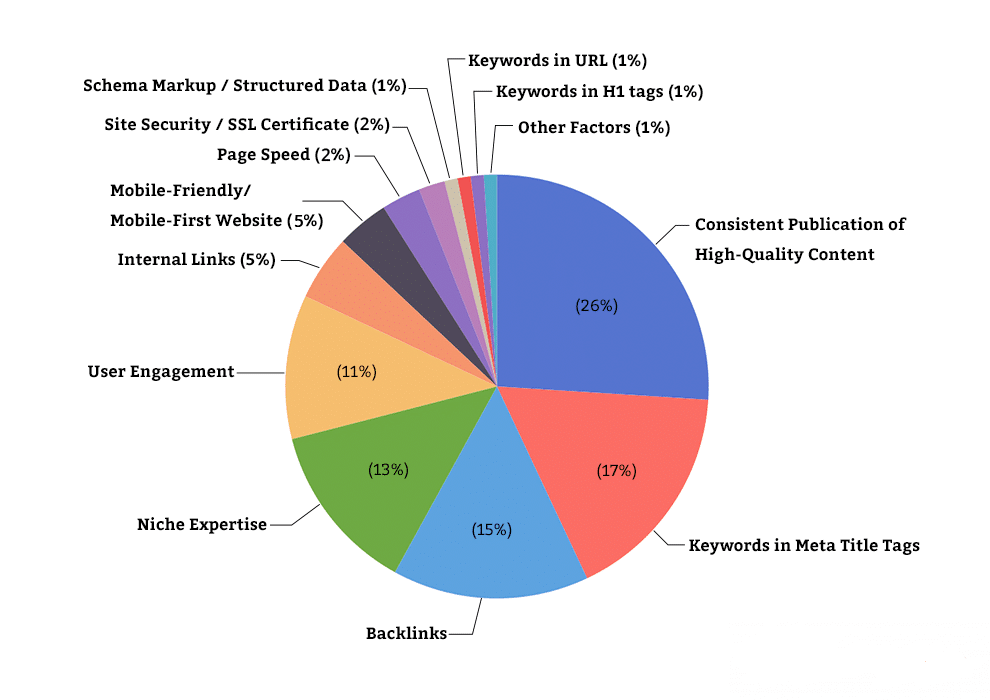In this article, we have featured Google Ranking Factors You Shouldn’t Ignore.
Google ranks websites based on backlinks, which are arguably the most important ranking factor.
They not only rank highly in Google’s algorithm but also have a strong correlation between organic traffic and backlinks.
However, no backlink will suffice. Each backlink must be relevant and come from a reputable website.
Higher-quality backlinks will help your site rank higher.
Backlinks are widely regarded as the most important ranking factor. How do we know this?
Backlinks are the foundation of PageRank, which is the basis of Google’s ranking algorithm.
Numerous factors influence a backlink’s ability to move the needle, but the two most important are relevance and authority.
Google Ranking Factors You Shouldn’t Ignore In 2024
Factor 1 – Freshness Of Content
Query-dependent freshness is a ranking factor that matters more for some queries than others.
For example, all of the results for “Brexit news” are extremely recent.
Google even displays a “Top Stories” feature that displays results from the previous few hours.
This occurs because Google understands that people want to see the most recent news.
Freshness still plays a role in other queries, but it is less important.
1) Action Item
Analyze the search results for your target keyword to determine the importance of freshness.
- If keeping the page fresh is important, either update it frequently or consistently publish new articles on the subject to keep up with demand.
- If freshness is important but not crucial, update your page regularly and refresh when your rankings begin to decline.
- If freshness isn’t a priority, concentrate your efforts on creating the best guide on the subject.
2) Relevance
Assume you’re looking for the best Italian restaurant in your town. You seek advice from two friends.
One is a chef, while the other is a veterinarian. Whom do you rely on for advice?
Because they are familiar with Italian cuisine, it is most likely the chef.
The opposite would be true if you were looking for dog food recommendations. The same concept is at work on the internet.
The most valuable links are those from relevant websites and pages.
3) Authority
Backlinks from high-quality pages on high-quality websites are the most effective.
The Domain Rating and URL Rating of a linking domain and web page can be used to determine their relative strength.
Factor 2 – Authority On Your Topic
It’s only natural that Google will give pages that come from a reputable source a higher ranking than those that don’t.
Your website must demonstrate expertise, dependability, and authority in its field of expertise, as well as a strong reputation for these qualities.
With this in mind, stay away from publishing content that isn’t related to your field.
Maintain a narrow focus on your website so that you can establish a reputation in a single area.
Google wants to rank pages that come from reputable sources, which goes beyond backlinks.
Is there any other evidence than anecdotal evidence for “topical authority” as a ranking factor? Absolutely.
Factor 3 – Search Engine Optimization
For each query, the Google algorithm does not rank all types of content.
If you search for an item to buy online, Google will return results from e-commerce categories.
If you ask Google how to do something, it will show you blog posts because it recognizes that you need to learn something.
As a result, you must be able to optimize your content for various queries.
You need to align your content properly with the search intent to get the best results.
1) Content Style
The dominant content style in the search results is content. It is almost always web pages, but it can also be videos.
It would be nearly impossible to place a web page on the first page of a search engine result. If you want to rank, you’ll need to make and optimize a video.
2) Content-Type
Blog posts, products, categories, and landing pages are the four types of content that almost always fall into one of four buckets.
3) Content Format
The term “content format” refers to the way information is presented.
Common formats include how-to’s, listicles, tutorials, news articles, and opinion pieces.
4) Content Angle
The content angle is the main selling point of the content, and the search results usually have a dominant angle.
Make an effort to match your content to the intent of the search.
5) In-Depth Content
Of course, Google needs to rank the most useful results for any given query, so, understandably, many content creators believe they need to create long-form content.
After all, don’t they have to cover everything the searcher could need to know?
However, it’s important to keep in mind that longer content isn’t always better.
Rather, success is defined by covering the topics that are most important to the searcher.
To create the most useful content, you can take cues from pages that rank at the top of search engine listings for your given topic.
Factor 4 – Maximum Page Speed
Page speed has been a top-ranking factor for over a decade, and while it isn’t as much of a problem as it was in 2010, it is still an issue if your page gives users a slow experience.
You don’t have to beat your competitors by a few milliseconds, but you should make sure your site isn’t so slow that it hinders users’ experiences.
Checking your page’s speed report in Google Search Console will reveal which pages are loading too slowly on mobile and desktop, and you can take steps to improve their performance.
Check the Speed report in Google Search Console if you’re concerned about page speed.
This shows which of your pages take the longest to load on both desktop and mobile devices.
Factor 5 – Optimal Security
HTTPS, which encrypts data between the server and the browser, provides enhanced security for your site’s visitors.
Users want and need to know that your site is safe to use, especially now that security is more important than ever.
A “not secure” warning will appear if your users are using the Chrome browser to view a non-encrypted site.
As a result, a large number of visitors will be turned off from viewing your content.
Fortunately, this is a simple problem to solve.
Simply ensure that you have an SSL certificate installed, which will make your website more secure.
Factor 6 – Mobile-Friendliness

Mobile searches have become more common in recent years, with around two-thirds of all searches now taking place on mobile devices.
Google made an update to its data code to include mobile-friendliness in 2015, and in 2019, it added it to the ranking factors for desktop searches as well.
The Report of Mobile Usability in Google Search Console will notify you if any of your pages aren’t mobile-friendly, allowing you to take immediate action.
Factor 7 – Positive User Experience

Google will prioritize content that provides visitors with the best possible user experience, and websites that benefit users and are optimized to improve their experiences will appear higher in search engine results.
You can ensure that your site provides a user-friendly experience by making the content simple to read, useful, and interesting, and the pages well-organized and responsively designed around the user’s needs, free of unwanted and intrusive advertisements.
You can ensure that your site provides the best results for the keywords you’re targeting by removing any distractions, logically organizing your content, conducting relevant research, and writing for readability.
FAQs
Why are backlinks important for ranking?
Backlinks from reputable sites boost your website’s authority and help it rank higher in search results.
What is PageRank?
PageRank is Google’s algorithm that ranks websites based on the quality and quantity of backlinks.
How do I know if freshness is important for my content?
Check if top search results for your keyword are frequently updated; if so, keep your content fresh.
How does topic authority impact ranking?
Google prefers content from sites that are experts in their field, so focus on your niche to build authority.
How can I make my site mobile-friendly?
Ensure your site is easy to navigate on mobile devices. Use Google Search Console to identify issues.
Quick Links
- How to Get Started with Google Analytics
- Duplicate Content: Why You Should Handle it & Not Let it to Google?
- Simple Ways To Improve Your SEO
- How to Optimize Your Anchor Text Strategy For SEO?
- Powerful SEO Tips For Writing Better Blog Posts
- Beginning Blogging Mistakes You Can Fix
Conclusion: Google Ranking Factors You Shouldn’t Ignore 2024
Although there are many Google ranking factors, the nine listed above should be your priority when creating content.
You’ll see your pages rank higher if you put in the effort to create engaging and interesting content that is relevant to searchers and provides a great user experience.


